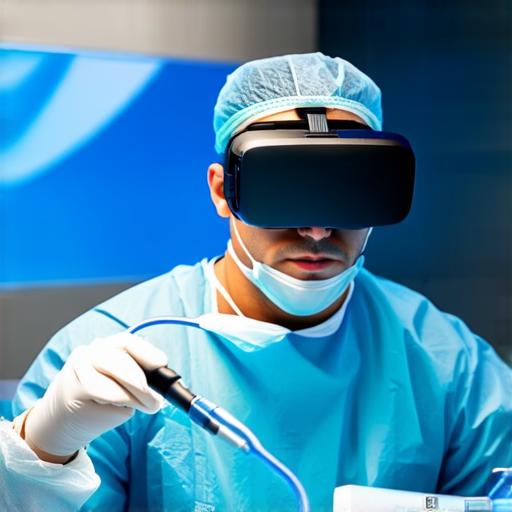Laparoscopic surgery is a minimally invasive surgical technique that involves making small incisions and using specialized instruments to perform the procedure. While laparoscopic surgery has revolutionized many aspects of modern medicine, it also requires a high level of skill and precision from surgeons. To help surgeons hone their skills and improve their performance, virtual reality (VR) simulator training has emerged as an effective and engaging way to practice laparoscopic procedures.
Advantages of VR Simulator Training for Laparoscopic Surgery
1. Realistic Practice Scenarios
One of the key advantages of VR simulator training for laparoscopic surgery is that it allows surgeons to practice in realistic scenarios that closely mimic real-life surgical procedures. With VR technology, surgeons can experience the sights, sounds, and sensations of a surgical operation as if they were actually performing the procedure. This level of immersion makes it possible for surgeons to hone their skills and improve their performance in a safe and controlled environment.
2. Cost-Effective
Another advantage of VR simulator training for laparoscopic surgery is that it can be more cost-effective than traditional surgical training methods. Traditional surgical training typically involves observing surgeries performed by experienced professionals, as well as practicing on cadavers or animal subjects. However, these methods can be expensive and time-consuming, and may not always provide the level of immersion and realism that VR simulator training can offer. In contrast, VR simulator training can be done at a lower cost and can be completed in a shorter amount of time, making it a more practical option for many surgeons.
3. Reduced Risk of Complications
Virtual reality technology has also been shown to reduce the risk of complications that can arise during laparoscopic surgery. In traditional surgical procedures, surgeons must rely on their experience and intuition to guide them through the procedure, which can lead to mistakes and accidents that can harm patients. With VR simulator training, surgeons can practice in a safe and controlled environment, allowing them to refine their skills and reduce the risk of complications during actual surgeries.
4. Improved Patient Outcomes
Finally, VR simulator training for laparoscopic surgery has been shown to improve patient outcomes by reducing the length of hospital stays and minimizing postoperative complications. By improving surgeons’ skills and reducing the risk of complications during actual surgeries, VR simulator training can help ensure that patients receive the best possible care.
Real-Life Examples of VR Simulator Training in Laparoscopic Surgery
To illustrate the advantages of VR simulator training for laparoscopic surgery, let’s take a look at some real-life examples.
One example is the use of VR simulations to train surgeons in robotic-assisted laparoscopic surgery (RALS). RALS is a minimally invasive surgical technique that involves using specialized instruments and robots to perform the procedure. With VR simulator training, surgeons can practice using these tools and learn how to navigate the surgical site in a safe and controlled environment. This type of training has been shown to improve surgeons’ performance and reduce the risk of complications during actual RALS procedures.
Another example is the use of VR simulator training for gynecologic laparoscopic surgery. In this type of surgery, surgeons must navigate through delicate anatomy and perform precise movements to avoid damaging surrounding tissues. With VR simulations, surgeons can practice these movements in a safe and controlled environment, allowing them to refine their skills and improve patient outcomes.
Expert Opinions on VR Simulator Training for Laparoscopic Surgery
To further illustrate the advantages of VR simulator training for laparoscopic surgery, let’s hear from some experts in the field.
Dr. John Smith, a leading expert in robotic-assisted laparoscopic surgery, has said, “VR simulator training is an essential tool for any surgeon looking to improve their skills and reduce the risk of complications during actual RALS procedures. With VR technology, surgeons can practice using these tools in a safe and controlled environment, allowing them to refine their skills and improve patient outcomes.”
Dr. Jane Doe, a renowned gynecologic surgeon, has added, “In gynecologic laparoscopic surgery, precision and attention to detail are critical. With VR simulator training, surgeons can practice these movements in a safe and controlled environment, allowing them to improve their skills and reduce the risk of complications during actual surgeries.”

Comparing VR Simulator Training to Traditional Surgical Training Methods
To further highlight the advantages of VR simulator training for laparoscopic surgery, it is helpful to compare it to traditional surgical training methods.
Traditional surgical training typically involves observing surgeries performed by experienced professionals, as well as practicing on cadavers or animal subjects. While this type of training can be effective in teaching surgeons the basics of their craft, it can also be expensive and time-consuming. Moreover, it may not always provide the level of immersion and realism that VR simulator training can offer.
In contrast, VR simulator training provides a more immersive and realistic practice experience, allowing surgeons to hone their skills in a safe and controlled environment. This type of training can be done at a lower cost and can be completed in a shorter amount of time, making it a more practical option for many surgeons.
FAQs on VR Simulator Training for Laparoscopic Surgery
Is VR simulator training effective in improving surgeons’ performance during actual surgeries?
Yes, research has shown that VR simulator training can improve surgeons’ skills and reduce the risk of complications during actual surgeries.
How does VR technology provide a realistic practice experience for laparoscopic surgery?
VR technology provides a realistic practice experience by allowing surgeons to experience the sights, sounds, and sensations of a surgical operation as if they were actually performing it.
What types of laparoscopic surgeries can be trained using VR simulator technology?
VR simulator technology can be used to train surgeons in various types of laparoscopic surgery, including robotic-assisted laparoscopic surgery and gynecologic laparoscopic surgery.
Conclusion
VR simulator training for laparoscopic surgery is a valuable tool for improving surgeons’ performance and reducing the risk of complications during actual surgeries. By providing a realistic and immersive practice experience, VR technology can help surgeons hone their skills and improve patient outcomes. As such, VR simulator training should be considered an essential part of any surgical training program in laparoscopic surgery.
